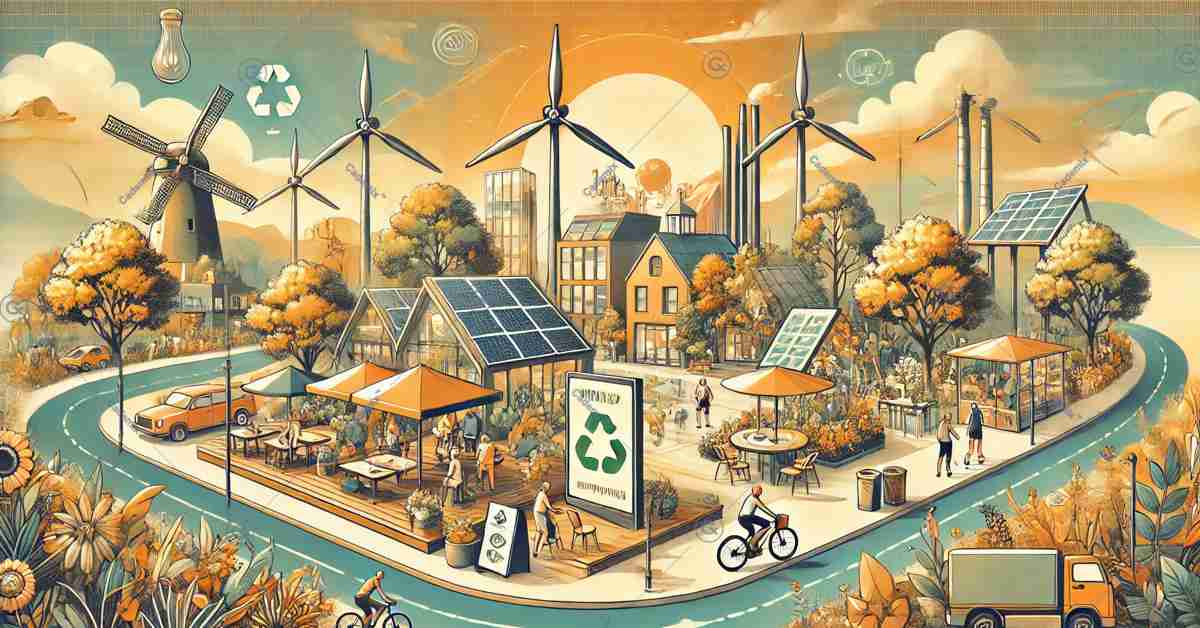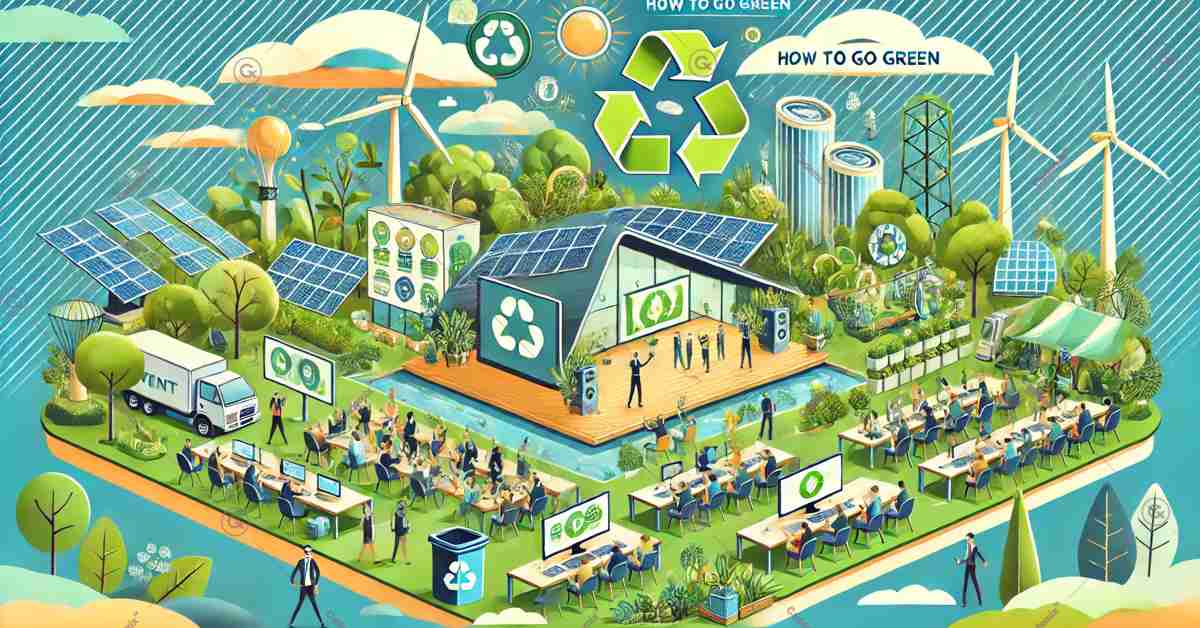This article, “Sustainability in Event Planning: How to Go Green,” provides a comprehensive guide for event management professionals on how to incorporate sustainable practices into their events. It covers key aspects of eco-friendly event planning, including the selection of sustainable venues, waste reduction strategies, and carbon footprint minimization. By leveraging advanced event technology tools, effective marketing strategies, and efficient budget management, event planners can balance sustainability with cost-effectiveness.
The article also delves into the importance of post-event evaluation and continuous improvement, highlighting the latest event trends for 2024, making it a must-read for those aiming to lead in sustainable event management.
By Samareh Ghaem Maghami, Associate Consultant and Project at Cademix Institute of Technology

Introduction
In today’s rapidly evolving landscape, sustainability has become a crucial element in Event Management. As the world becomes increasingly aware of the environmental impact of large gatherings, incorporating sustainable practices into Event Planning is no longer a luxury—it’s a necessity. From reducing carbon footprints to minimizing waste, the demand for eco-friendly events is growing across all sectors. As a result, event planners are now tasked with the challenge of balancing sustainability with traditional priorities such as Budget Management and Logistics Planning.
This guide explores how to seamlessly integrate sustainability into every aspect of Event Management, from selecting eco-friendly venues to utilizing cutting-edge Event Technology Tools. Whether you’re organizing a small corporate meeting or a large-scale international event, sustainable practices can enhance your event’s appeal while contributing positively to the environment. By embracing the latest Event Trends for 2024 and leveraging innovative Marketing Strategies, event planners can not only meet but exceed the expectations of stakeholders and attendees alike.
As we dive into the various strategies for sustainable event planning, this article will equip you with the knowledge and tools to lead the way in Sustainable Event Management. From Hybrid Events to Vendor Negotiation, every decision can play a part in creating events that are not only memorable but also responsible.
Performance of Sustainability in Event Planning
Defining Sustainability in Event Management
Sustainability in Event Management is about making intentional choices that reduce the environmental impact of an event while also enhancing its social and economic value. In the realm of Event Planning, sustainability involves more than just opting for recyclable materials or reducing energy consumption; it requires a holistic approach that integrates eco-friendly practices throughout the event lifecycle. From initial planning to post-event evaluation, sustainable Event Planning considers the long-term effects of every decision on both the planet and the community.
Key principles of sustainable Event Management include resource efficiency, waste reduction, and minimizing carbon footprints. Event planners must consider how to reduce energy usage, limit water consumption, and choose sustainable materials, all while maintaining a high standard of attendee experience. By prioritizing these principles, event planners can create events that not only meet client expectations but also contribute to broader environmental goals.
The Role of Technology in Sustainable Events
The integration of Event Technology Tools plays a pivotal role in achieving sustainability goals. Technology offers numerous solutions that can significantly reduce the environmental impact of events. For instance, digital ticketing and online registration systems eliminate the need for paper, while virtual event platforms and Hybrid Events reduce the carbon footprint associated with travel. Moreover, the use of advanced analytics and reporting tools helps in tracking sustainability metrics, allowing event planners to make data-driven decisions that enhance the eco-friendliness of their events.
Adopting technology in Event Management also streamlines Logistics Planning and enhances Budget Management by reducing the need for physical resources and optimizing operational efficiency. For example, energy-efficient lighting systems and smart HVAC controls can lower energy consumption, while virtual collaboration tools reduce the need for physical meetings, saving both time and resources. As event planners continue to embrace these technologies, they not only improve sustainability but also position themselves at the forefront of the latest Event Trends for 2024.
By understanding and implementing these sustainable practices, event planners can lead the way in creating environmentally responsible events that align with the growing demand for green solutions in the industry.
Choosing Eco-Friendly Venues
Selecting Sustainable Event Venues
One of the most impactful decisions in Event Planning is the choice of venue. A venue’s sustainability credentials can significantly influence the overall environmental impact of an event. When selecting a venue, event planners should prioritize locations that are committed to sustainable practices, such as energy efficiency, waste reduction, and water conservation. These venues often have green certifications, such as LEED or BREEAM, which indicate their commitment to environmental responsibility.
Eco-friendly venues contribute to more efficient Logistics Planning by reducing the need for extensive transportation and minimizing the use of non-renewable resources. Additionally, these venues often offer in-house sustainable solutions, such as solar-powered energy, rainwater harvesting systems, and composting facilities, which can help event planners achieve their sustainability goals without incurring significant additional costs. The strategic selection of a sustainable venue also positively impacts Budget Management, as many of these venues offer long-term cost savings through reduced utility expenses and efficient resource management.
Green Certifications for Venues
Understanding green certifications is essential for event planners who aim to incorporate sustainability into their Event Management practices. Certifications like LEED (Leadership in Energy and Environmental Design) and BREEAM (Building Research Establishment Environmental Assessment Method) provide a clear indication of a venue’s commitment to sustainable operations. These certifications evaluate various aspects of a venue’s environmental impact, including energy use, waste management, and indoor environmental quality.
For those involved in International Event Management, green certifications can be a critical factor when choosing venues across different regions. They ensure that the venue meets a recognized standard of sustainability, regardless of its location. Furthermore, selecting a venue with green certifications can enhance the event’s appeal to environmentally conscious stakeholders and attendees, aligning with the growing trend towards sustainability in the industry.
By choosing venues with these certifications, event planners not only contribute to global sustainability efforts but also set a standard for eco-friendly Event Planning that can influence the entire industry. These venues, often equipped with the latest in sustainable technology, also align with emerging Event Trends for 2024, ensuring that your event is both modern and environmentally responsible.
Incorporating these considerations into the venue selection process allows event planners to significantly reduce the environmental impact of their events while enhancing their reputation for Sustainable Event Management.

Reducing Waste and Carbon Footprints
Waste Management in Event Planning
Effective waste management is a cornerstone of sustainable Event Planning. Events, regardless of size, have the potential to generate significant amounts of waste, from food and beverage containers to promotional materials. To address this, event planners must implement strategies that minimize waste production and maximize recycling and composting efforts. This begins with thoughtful Vendor Negotiation, where planners can prioritize suppliers that offer eco-friendly products and services, such as biodegradable utensils, reusable signage, and digital alternatives to printed materials.
Incorporating waste reduction strategies into Event Management can include setting up clearly labeled recycling and composting stations, partnering with local organizations to donate excess food, and encouraging attendees to bring their own reusable items. Additionally, leveraging Event Technology Tools can significantly reduce paper waste by using digital ticketing, e-invitations, and mobile apps for event programs. These steps not only reduce the environmental impact but also resonate with attendees who are increasingly mindful of sustainability.
By making waste management a priority, event planners can significantly reduce the ecological footprint of their events, aligning with broader Sustainability goals and emerging Event Trends for 2024 that emphasize environmental responsibility.
Carbon Footprint Reduction
Reducing the carbon footprint of an event is another critical aspect of sustainable Event Management. This involves minimizing the greenhouse gas emissions associated with various event activities, such as transportation, energy use, and waste disposal. One effective strategy is to encourage the use of public transportation, carpooling, or cycling for attendees, which can be facilitated through the event’s Marketing Strategies and communications.
Hybrid Events have emerged as a powerful tool in reducing carbon footprints by combining in-person and virtual elements. By allowing remote participation, Hybrid Events reduce the need for long-distance travel, significantly lowering the event’s overall carbon emissions. Additionally, the use of energy-efficient lighting, heating, and cooling systems in venues, along with renewable energy sources, can further minimize the environmental impact.
Event planners can also offset remaining carbon emissions by investing in carbon offset programs, which fund projects aimed at reducing greenhouse gas emissions elsewhere. By integrating carbon footprint reduction into their Event Planning processes, planners not only enhance the sustainability of their events but also position themselves as leaders in the field of Sustainable Event Management.
These efforts in waste management and carbon footprint reduction not only help in achieving sustainability goals but also enhance the reputation of the event and its organizers. As the demand for greener events continues to rise, these practices will become increasingly integral to successful Event Management, ensuring that events are not only impactful but also environmentally responsible.
Sustainable Marketing and Communication Strategies
Eco-Friendly Marketing Strategies
In the realm of Event Management, marketing plays a pivotal role in shaping the success of any event. However, traditional marketing approaches can often conflict with sustainability goals, leading to excessive waste and resource consumption. To align with the principles of sustainable Event Planning, event organizers must adopt Eco-Friendly Marketing Strategies that reduce environmental impact while effectively promoting the event.
One of the most effective ways to achieve this is by leveraging digital platforms for Event Marketing. Utilizing social media, email campaigns, and online advertising not only reduces the need for printed materials but also allows for more targeted and measurable marketing efforts. These digital tools can be further enhanced by incorporating Event Technology Tools such as virtual reality or augmented reality experiences that engage attendees in an immersive and sustainable way.
Another key aspect of sustainable marketing is the use of eco-friendly promotional materials. This might include digital swag such as e-books or discount codes, or physical items made from recycled or sustainable materials. Vendor Negotiation can play a significant role here, as event planners can work with suppliers to source environmentally responsible products that align with the event’s sustainability goals.
By integrating these eco-friendly marketing strategies, event planners not only reduce their environmental footprint but also appeal to a growing audience of eco-conscious consumers. This approach not only enhances the event’s green credentials but also positions it as a leader in sustainable Event Management.
Effective Communication in Sustainable Events
Effective communication is essential in ensuring that the sustainability efforts in Event Planning are recognized and appreciated by stakeholders and attendees. Transparent communication about the event’s sustainability goals, practices, and outcomes not only builds trust but also enhances the event’s reputation.
One approach to achieving this is by incorporating sustainability messaging into all aspects of the event’s communications strategy. From the initial invitations to post-event surveys, every touchpoint should reflect the event’s commitment to sustainability. This can be achieved through clear, consistent messaging across all platforms, including social media, email, and the event website.
Leadership in Event Planning is also critical when it comes to communicating sustainability. Event planners should take the lead in educating stakeholders and attendees about the importance of sustainable practices and how they are being implemented at the event. This can be done through dedicated sessions, workshops, or interactive displays that highlight the event’s green initiatives.
Moreover, Experiential Marketing can be leveraged to create memorable, sustainability-focused experiences for attendees. This could involve interactive exhibits that showcase eco-friendly practices, or hands-on activities that encourage participants to engage with sustainability in a meaningful way. By making sustainability a core part of the event experience, planners can ensure that their green efforts are not only recognized but also appreciated by all involved.
In conclusion, by adopting Eco-Friendly Marketing Strategies and ensuring effective communication, event planners can significantly enhance the sustainability of their events. These practices not only contribute to the event’s environmental goals but also strengthen its overall impact and success in the competitive landscape of Event Management.

Budget Management for Sustainable Events
Balancing Costs and Sustainability
One of the most common challenges in Event Management is finding the balance between sustainability and budget. Many event planners face the misconception that sustainable practices are prohibitively expensive. However, with strategic Budget Management, it is possible to create eco-friendly events that are both cost-effective and impactful. The key lies in understanding where to invest and how to leverage available resources for maximum sustainability.
First, event planners should prioritize spending on areas that offer the most significant environmental impact. For example, investing in Event Technology Tools that reduce waste, such as digital registration systems and virtual event platforms, can lead to long-term savings by eliminating the need for printed materials and reducing travel costs. Additionally, choosing energy-efficient venues and eco-friendly vendors can result in lower utility bills and reduced waste management expenses.
Vendor Negotiation also plays a crucial role in balancing costs and sustainability. By negotiating with vendors to provide bulk discounts on sustainable materials or opting for local suppliers to reduce transportation costs, planners can keep expenses in check while maintaining a commitment to eco-friendly practices. Furthermore, long-term partnerships with sustainable vendors can lead to better pricing and more consistent quality, further enhancing budget efficiency.
Incorporating Hybrid Events into the planning process is another cost-effective strategy that aligns with sustainability goals. By blending in-person and virtual elements, planners can reduce the need for large venues, extensive catering, and travel, all of which contribute to a lower carbon footprint and reduced expenses. Hybrid events also offer the flexibility to scale attendance and resources according to budget constraints, making them an increasingly popular choice in modern Event Management.
Leveraging Technology and Vendor Negotiation
The use of Event Technology Tools is not only essential for creating a sustainable event but also for optimizing Budget Management. For instance, using virtual platforms for meetings, presentations, and networking can significantly reduce costs associated with physical space, printed materials, and travel. These tools also allow for more precise tracking of resource usage and attendee engagement, enabling planners to make data-driven decisions that enhance both sustainability and cost efficiency.
Effective Vendor Negotiation is another critical component in managing a sustainable event budget. Event planners should seek out vendors who are committed to sustainability and are willing to collaborate on cost-effective solutions. This might involve negotiating for eco-friendly alternatives, such as compostable tableware or energy-efficient lighting, at competitive prices. Additionally, planners can explore opportunities to reduce costs by bundling services with a single vendor or by securing sponsorships that cover some of the expenses associated with sustainability initiatives.
By strategically leveraging technology and negotiating effectively with vendors, event planners can achieve a balance between sustainability and budget. This approach not only helps in managing costs but also ensures that the event remains aligned with the latest Event Trends for 2024, where sustainability is increasingly becoming a key factor in the success of any event.
In conclusion, Budget Management for sustainable events is about making smart, informed decisions that maximize both financial and environmental outcomes. By focusing on high-impact areas, utilizing technology, and negotiating effectively with vendors, event planners can create successful, eco-friendly events that meet budgetary requirements and contribute positively to the environment. This approach not only enhances the overall event experience but also positions the event as a leader in Sustainable Event Management.
Post-Event Evaluation and Continuous Improvement
Post-Event Evaluation
A crucial yet often overlooked aspect of Event Management is the post-event evaluation. This step is vital for understanding the effectiveness of the sustainability strategies implemented during the event. By conducting a thorough Post-Event Evaluation, planners can assess what worked, what didn’t, and how future events can be even more environmentally friendly and cost-effective.
The evaluation process should include a comprehensive analysis of key sustainability metrics such as waste reduction, energy consumption, and carbon footprint. Leveraging Event Technology Tools can significantly enhance this process by providing detailed data on attendee engagement, resource usage, and overall environmental impact. This data-driven approach allows planners to pinpoint areas where sustainability efforts were successful and identify opportunities for improvement.
Additionally, feedback from attendees, stakeholders, and vendors should be gathered to gain insights into their perceptions of the event’s sustainability efforts. This feedback is invaluable for refining future strategies and ensuring that the event’s commitment to sustainability is recognized and appreciated by all parties involved. By making Post-Event Evaluation a standard part of the Event Planning process, planners can continuously improve their sustainability practices, aligning with the latest Event Trends for 2024.

Continuous Improvement in Sustainability
Sustainability in Event Management is not a one-time achievement but an ongoing process of refinement and innovation. As the industry evolves and new Event Trends emerge, it’s essential for event planners to stay ahead of the curve by continuously improving their sustainability practices. This involves staying informed about the latest developments in Event Technology Tools, eco-friendly materials, and sustainable Event Planning techniques.
One of the most effective ways to ensure continuous improvement is by setting clear, measurable sustainability goals for each event. These goals should be ambitious yet achievable, providing a roadmap for the event’s sustainability journey. By regularly reviewing and updating these goals based on Post-Event Evaluation findings and industry trends, event planners can ensure that their events remain at the forefront of Sustainable Event Management.
Moreover, adopting a culture of innovation and adaptability within the event planning team is crucial for continuous improvement. Encouraging creativity and out-of-the-box thinking can lead to the discovery of new, more effective ways to reduce environmental impact and enhance attendee experience. Whether it’s exploring the latest in Hybrid Events technology or experimenting with new waste management solutions, staying proactive in seeking out and implementing improvements is key to long-term sustainability success.
Finally, collaboration with stakeholders, vendors, and industry peers can also drive continuous improvement. By sharing knowledge, resources, and best practices, the entire event management community can work together to elevate the standard of sustainability in the industry. This collaborative approach not only enhances individual events but also contributes to the global movement towards more sustainable practices in Event Management.
In conclusion, Post-Event Evaluation and continuous improvement are critical components of successful Sustainable Event Management. By rigorously assessing the outcomes of each event and remaining committed to ongoing innovation, event planners can ensure that their sustainability efforts are not only effective but also evolve with the changing demands of the industry. This approach not only secures the long-term success of their events but also reinforces their role as leaders in the future of sustainable event planning.
Conclusion: The Future of Sustainable Event Management
As we look toward the future, it’s clear that sustainability will continue to be a driving force in the world of Event Management. The increasing awareness of environmental issues, coupled with the demand for socially responsible events, means that Sustainable Event Planning is not just a trend but a necessity. Event planners who embrace this shift will not only contribute to a healthier planet but also position themselves as leaders in an industry that values innovation and responsibility.
The integration of Event Technology Tools, the selection of eco-friendly venues, and the implementation of effective Budget Management strategies are just a few of the ways planners can make their events more sustainable. Moreover, the rise of Hybrid Events and the growing importance of Post-Event Evaluation highlights the need for continuous improvement and adaptation to emerging Event Trends for 2024 and beyond.
As the industry continues to evolve, the role of Leadership in Event Planning will become increasingly important. Leaders in this space must not only implement sustainable practices but also advocate for them, influencing stakeholders, vendors, and attendees to prioritize environmental responsibility. Through effective Stakeholder Management and Experiential Marketing, event planners can create memorable, impactful events that resonate with eco-conscious audiences and set a new standard for sustainability.
In the end, the future of Sustainable Event Management lies in the hands of those who are willing to innovate, adapt, and lead by example. By making sustainability a core principle of Event Planning, planners can ensure that their events are not only successful but also contribute to a positive, lasting impact on the environment. This commitment to sustainability will not only shape the future of the events industry but also play a crucial role in addressing the broader challenges of climate change and resource conservation.
As we move forward, the key to success in Sustainable Event Planning will be a combination of creativity, technology, and a deep commitment to continuous improvement. By staying ahead of Event Trends, leveraging the latest tools, and fostering a culture of sustainability, event planners can lead the way in creating a greener, more responsible future for the industry. This approach not only aligns with global sustainability goals but also ensures that events continue to inspire, engage, and make a meaningful difference in the world.

About the Author
Samareh Ghaem Maghami is a seasoned professional in Event Management and Sustainable Event Planning, with a rich background in interior decoration and event management. Currently pursuing a master’s degree in ECO-Designat in Wiener Neustadt in Austria, Samareh is also an active member of the Cademix Institute of Technology, where she contributes her expertise in innovative and sustainable practices within the events industry. With a deep passion for combining creativity and sustainability, Samareh consistently explores new ways to elevate event experiences while minimizing environmental impact.
For more insights into sustainable event management, I invite you to read my other article “Innovative Marketing Strategies for Event Managers,” published in the Cademix Magazine. Should you wish to discuss event planning strategies or learn more about my work, please feel free to contact me. I look forward to connecting with fellow professionals and sharing ideas that drive the future of sustainable event management.
Please feel free to contact her at:
E-mail: sam.gh.maghami@gmail.com
E-mail: samareh.ghaem-maghami@cademix.org
LinkedIn: https://www.linkedin.com/in/samareh-ghaem-maghami
Xing: https://www.xing.com/profile/Samareh_GhaemMaghami

